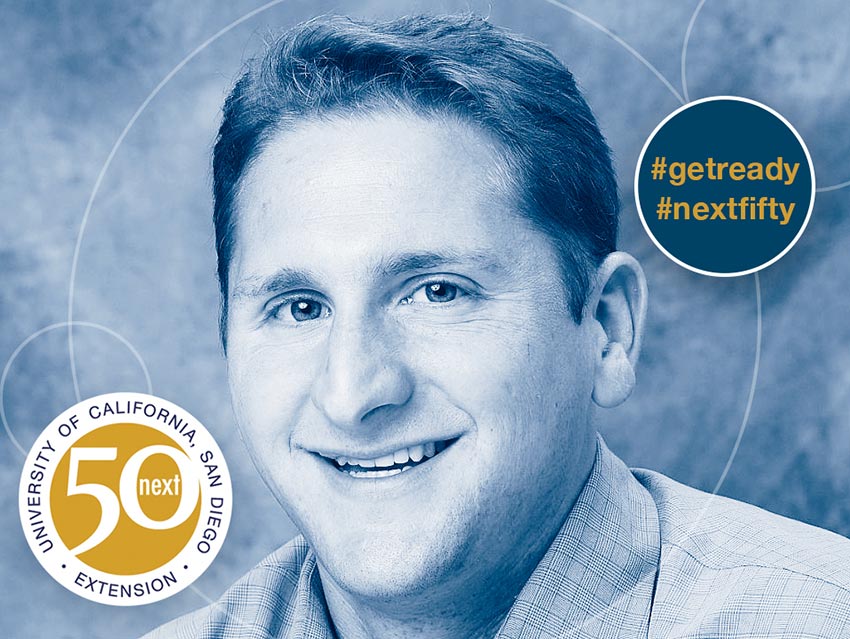30 August 2016
50 Voices of the Future: Thad Kousser talks politics and data

In honor of UC San Diego Extension’s first 50 years, 50 Voices of the Future asks thought leaders about the trends, breakthroughs and social advances they foresee over the next 50 years.
Nowadays political scientists are able to study and analyze more data than at any time in human history, with social-media sites and the rest of the internet offering a treasure trove of information about human behavior and its influence on politics. Such massive amounts of information can be overwhelming, according to Thad Kousser, chair of UC San Diego’s Department of Political Science. One of the profession’s biggest challenges, he says, is figuring out how to make sense of all this data in meaningful ways. He’s confident that the future’s best political scientists will take the same approach of today’s best practitioners: they will come up with compelling theories, find creative ways to test those theories – and follow the facts wherever those facts might lead.
(1) Why is the work you do important?
The political world is becoming more and more confusing, dynamic and high-stakes. Our challenges is understanding both the primal political instincts that have always motivated voters and candidates and how those translate into the new political world that we live in, which is increasingly online and high-tech. That’s what makes being in this field interesting.
(2) What are the influential/exciting developments happening in your field now and why?Our department is trying to make sure we use smart analysis, shaped by rigorous theory, to attack the massive data sets being created by the internet. One colleague of mine at UC San Diego worked with Facebook to run an election experiment involving millions of people, which showed clearly that you’re more likely to vote if you find out that your social-media connections also voted. One of our new UC San Diego colleagues has done work on which blogs are censored in China and found that if you want to oppose the government, that’s ok. But if you want to mobilize people to get together against the government, that’s what they’ll censor. And she found this by analyzing millions of blogs that were censored and then ran a similar experiment where they put up lots of different kinds of blogs to see which ones would get taken down by the great firewall. So if you say, hey, I don’t like what the government’s going, they’ll leave that up. But if you say, hey, let’s all get together on a street corner to protest it, they’ll take that down. The point of all this is that gathering data is no longer the challenge. Making sure we learn about politics through that data is the challenge.
(3) What’s the next big thing?
Students coming to us over the next ten to twenty years are going to have such strong STEM (science, technology, engineering, mathematics) backgrounds. They’re going to take this big leap forward in their ability to scrape the web, to use artificial intelligence, to quickly code and categorize data. We want to make sure political science is relevant to students and allows them to use those analytical skills to learn about and shape the political world. Also, we want to make sure we’re asking the right questions with all these massive data sets and high-powered tools.
(4) How big an impact will your field play in shaping the future of the San Diego region and beyond?
San Diego is at a time of major demographic transition that will lead to political transition. We have colleagues who are running surveys near the border. We have colleagues sending students out to internships throughout the city in political and community groups. We have a lot of scholars working with community non-profits to figure out how to turn out voters who are new to the country and new to the political process. Those are the ways that our discipline and our department will try to play a role in shaping San Diego.
(5) Hop into your time machine…what does the future look like for this field in 50 years? How can individuals/companies get prepared for what’s next?There will be new statistical techniques and new data sets that I can’t imagine. But what I hope is that they’ll be combined with what our discipline has always done well, which is immerse yourself in real political contexts so you can get a sense for how the political world works, then come up with hypotheses you put at risk with research where you can either confirm or disprove your hypothesis. That’s what makes political science a true science.
Thad Kousser is one of the panelists in an upcoming discussion featuring Scott Lewis (Voice of San Diego Editor-in-Chief) and Laura Fink (professional political consultant) and is being moderated by Washington editor-at-large for The Atlantic, Steve Clemons. A kickoff event for this year’s Politifest, the panel will examine how this year’s presidential election is fundamentally reshaping the political process at every level of government – national, state, and local – both now and into the future.